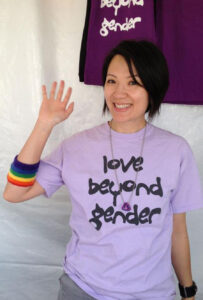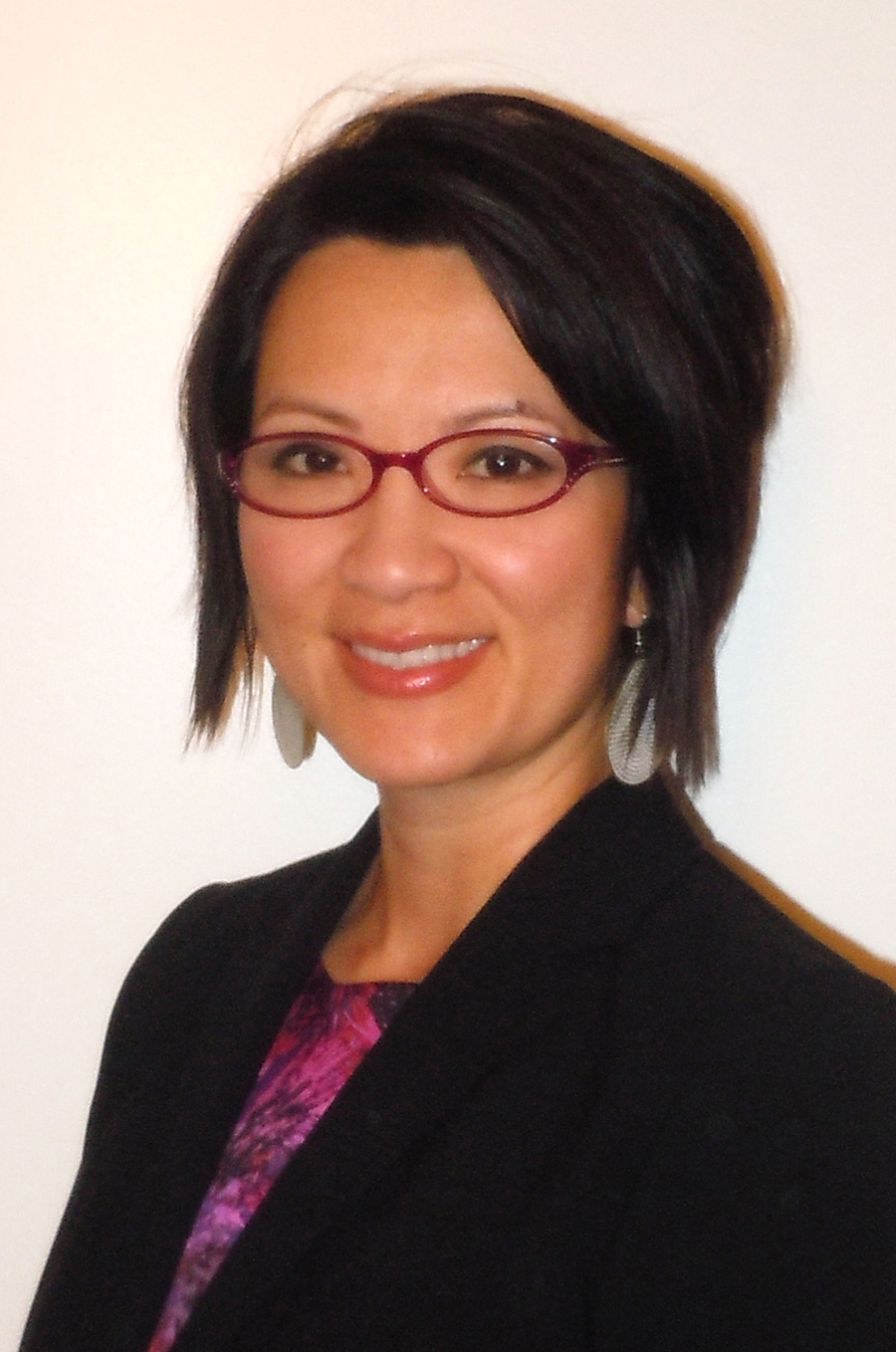Interview by Robyn Ochs
Mimi Hoang, Ph.D., is a clinician, educator, author and advocate with over 15 years of experience in cultural diversity issues, specifically with the bisexual and Asian Pacific Islander communities. Since 1999 she has cofounded three bisexual organizations in Los Angeles: the Los Angeles Bi Task Force (LABTF), amBi (the LA Bi Social Community), and Fluid UCLA. With two publications under her belt – a research article on bisexual identity and internalized biphobia in the Journal of Bisexuality and a book chapter on bi women in The Essential Handbook of Women’s Sexuality – Dr. Hoang currently works as a Staff Psychologist at Loyola Marymount University and teaches at Antioch University Los Angeles. She has earned international recognition for her leadership, including a seat at the inaugural White House Bisexual Roundtable in 2013.
How did you come to be an advocate for bisexual people?
Coming out was not easy for me, as I was an immigrant, raised in a traditional and low socio-economic status Asian household, and grew up never even hearing the word “bisexual.” Luckily, when I went to UCLA, I heard about their LGBT Mentoring Program and found an amazing bi mentor. When there was talk about starting up a new bi group, I volunteered to co-lead. I had already graduated, but I was one of the few students who were out and passionate about leading this group, so Dr. Ronni Sanlo, the head of the LGBT Center at the time, said it was okay, so along with Maria Guerrero, a UCLA student, I launched Fluid in fall 1999. I wanted to create a safe space for students so that they wouldn’t have to go through the struggles that I went through. I ran Fluid for two years, and that’s how I met Faith Cheltenham (current President of Bi Net USA), who led Fluid after I left. I’ve been doing bi activism ever since!
You are one of the co-founders of amBi. Can you tell us more about this organization and how it came into being?
BiNet LA was active in the ’80s and ’90s but it disbanded in 2004-5,except for a listserv. I had lost touch after starting grad school in San Diego and doing a brief stint with the San Diego Bisexual Forum, led by the late Dr. Fritz Klein. I later returned to LA and finished my dissertation on bi identity and really wanted to rally the community, so I asked people on the listserv if anyone wanted to meet monthly for coffee. That first meeting, in the summer of 2006, about ten people showed up, and we named the group AMBI (which stood for “A Meeting of Bi Individuals,” but now it’s spelled “amBi” and pronounced “am bi”). It evolved into a coffee meeting plus a social event every month, and now it’s on Meetup. com, has over 900 members, and five to ten events monthly. I created amBi to be an “out-and-about” social network, because I’d been to sit-in-a-circle discussion groups, but I didn’t need to figure out my own identity anymore – I wanted to make friends and hang out in “normal” public places. So most amBi events are at venues like restaurants, movie theaters, etc. I’m more behind-the-scenes now and Ian Lawrence is the head, but I’m so proud of how amBi has grown and hope it can be a model for other bi groups.
What other organizations are you (or have you been) active with?
After amBi, I helped co-found the Los Angeles Bi Task Force in 2008 (originally called the LA Bi Center Planning Committee), a non-profit organization promoting bi education, advocacy, and cultural enrichment. It was started when Jerry Mussari, a longtime bi activist, called for a meeting to form a bi resource center. That’s our long-range goal, but for the shortterm, LABTF provides resources like organizing panels and workshops, as well as bi visibility at West Hollywood Pride, the annual arts festivals for Celebrate Bisexuality Day, and bi leaders events. LABTF has featured the renowned researcher Dr. Lisa Diamond, collaborated with prominent folks like Mike Szymanski and Kyle Schickner, and recently co-sponsored an editorial review of GLAAD’s Media Reference Guide. We also advise and support local bisexual discussion groups in LA (four in total). LABTF is currently a “virtual tenant” at the LA Gay & Lesbian Center, but we hope to obtain a permanent physical space one day, similar to the Bisexual Resource Center in Boston.
You authored a study on bisexual identity in 2011. What did you find? Any surprises?
My research article in the Journal of Bisexuality (co-authored with Drs. Judy Holloway and Richard Mendoza) was based on my dissertation, a correlational study on bisexual identity congruence, internalized biphobia, and infidelity (in monogamous relationships) among bisexual women. I was inspired after reading Tipping the Velvet and thinking about why there’s this perpetual stereotype of the “cheating bisexual.” My guess was that maybe some women ashamed of their bisexual feelings may “act badly” and cheat, similar to how Nan’s first love, Kitty, defects for a man after feeling uncomfortable about their same-sex liaison. My results supported this: faithful bi women have less internalized biphobia than unfaithful bi women. My other finding was that women with lower internalized biphobia had higher bi identity congruence (“congruence” meaning attractions, behaviors, and self-labels all match) This is a technical way of saying that a woman who is inwardly and outwardly bi tends to feel less shame. Or, the more congruent, the more confident, and vice versa. I was excited to have data supporting my intuition and my experience knowing many, many bisexual women who were out, who didn’t feel ashamed, and didn’t cheat on their partners. What surprised me was that more women in my study were unfaithful with male partners than female partners, which may reassure many lesbians out there! Unfortunately, since this was a small dissertation study, I didn’t have the time/resources to include bi men, but I hope that one day someone can replicate my results with men.
I hear that you call yourself a “professional bisexual” – so do I! It’s great to meet someone else in the same profession. (laughs) What do you mean by this?
Yes, I indeed call myself a “professional bisexual” because I’ve been doing so much bi community work – 15 years now – that it does feel like a second career, and the fact that I’m a licensed clinical psychologist now and do talks and educate people also makes it seem like I’m a “professor of bisexuality,” which I guess I actually am because one of my other hats is teaching the first-ever eight-hour course on bisexual-affirmative psychotherapy!
What keeps you going?
Knowing that there are still so many people out there who are alone and afraid and don’t know where to turn to about their bi feelings. Meeting people who have driven two or three hours just to attend an amBi or LABTF event. Hearing people say that I’m the “first bisexual person” they’ve met – which is frustrating because I’m sure there are people all around them who are bi but just haven’t come out yet. And more recently, presenting on bisexual mental health at the inaugural White House Bisexual Roundtable and discovering staggering statistics that bisexual people face many mental health disparities compared to straight and even gay/lesbian people.
What have been a few high points of your bi activism, moments when you felt that we just might be making a difference?
I feel renewed whenever I meet a person who says that joining amBi has changed their lives and they finally found “a home,” or when I do a “Bi 101” talk and afterwards a bisexual individual thanks me for saying some things they’ve been afraid to say or I backed them up on with research on something they’ve already tried to say. Recently I did a workshop and a middle-aged Asian American woman came up to me and thanked me for educating her because she has a bisexual daughter and she doesn’t know what advice to give her daughter on dating men and women. I just thought, “My, how times have changed!” I was also very gratified to hear that a few gay-identified staff at the LA Gay & Lesbian Center came out as bisexual after they saw us marching in the West Hollywood Pride Parade!
The theme of this issue is “Mental Health.” What do you want readers to know?
I’ve written a lot on bi women in my book chapter in The Essential Handbook of Women’s Sexuality, and my recent White House trip also really got me thinking about the status of bi mental health. I think we, as bisexual women, are a complex group and have complex needs and really have to take care of our well-being. Bisexual people in general already face higher rates of depression, anxiety, and substance abuse than gay/ lesbian people and heterosexual people, and are six times more likely (with gay/ lesbian people four times more likely) to report suicidality than heterosexual peers. As for bi women, 45 percent – nearly half – have seriously considered or attempted taking their own lives. That’s startling! The Bisexual Invisibility Report also reported that bi women face higher rates of intimate partner violence when with monosexual partners and have higher rates of poor general health. Studies are finally parceling out bi participants from gay/lesbian participants, and it’s not looking good. So that means we need to reach out to our bi women, get them proper health care, and empower them to feel proud of their bi identities and make healthy decisions. If you are a bisexual woman, listen to your heart but also honor your wisdom. Be more out but also set healthy boundaries with your partners, your friends and your family. Find a bi community (or start one!), and seek professional help when things get bad. Because you matter. And things do get better!
What advice would you give to a bi woman searching for a therapist?
Be selective. Don’t be afraid to “therapist shop” and ask therapists for a free preview/ consultation. That’s what I advise everyone, but for bi folks, it’s especially important to screen your therapist because not all therapists are bi-friendly and even fewer are bi-knowledgeable. Don’t be afraid to ask if they have worked with bi clients before or been trained on bi issues. Even if they have very little experience, see if they’re at least willing to learn or consult. That will tell you a lot. And very importantly, come out to your therapists and your health care providers. They can’t fully help you if they don’t know about all the sides of your psychological and physical health.


